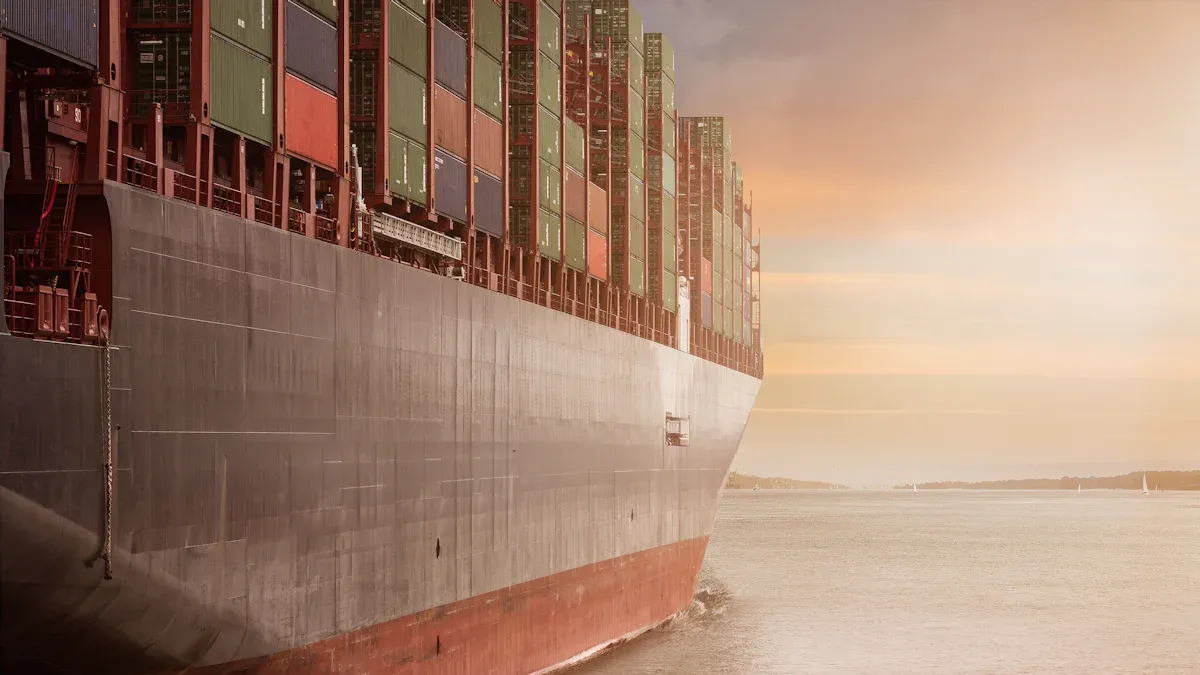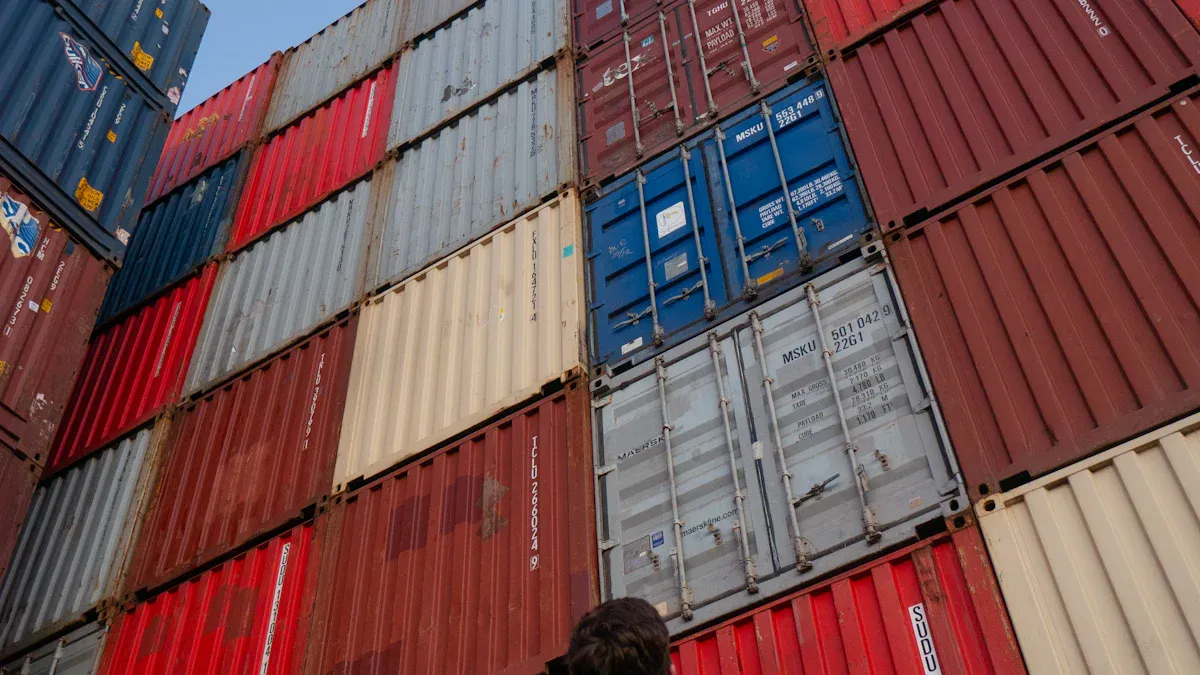Understanding Incoterms and their impact on bulk orders from China

Incoterms, or International Commercial Terms, are essential for global trade. They define the responsibilities of buyers and sellers, ensuring clarity in transactions. For bulk orders from China, selecting the right Incoterm impacts freight charges, logistics, and risk management. For example, terms like FOB or CIF determine who handles shipping and insurance, preventing costly misunderstandings. This clarity is especially crucial when working with flashlight wholesale distributors or other suppliers, as it optimizes supply chains and avoids disputes.
Key Takeaways
Incoterms explain what buyers and sellers must do in trade. They make things clear and prevent arguments.
Picking the right Incoterm, like FOB or CIF, affects shipping costs, delivery plans, and risks for big orders.
Knowing Incoterms helps stop problems like customs delays or confusion about duties.
Key Incoterms and their implications

FOB (Free on Board)
FOB is one of the most commonly used Incoterms for bulk orders from China. Under this term, the seller handles all costs and risks until the goods are loaded onto the shipping vessel. Once the goods are on board, the buyer assumes responsibility for shipping, insurance, and other costs. This clear division of responsibilities makes FOB a preferred choice for many importers.
Role | FOB Origin Responsibilities | FOB Destination Responsibilities |
|---|---|---|
Seller | Prepares goods, loads them onto the vessel, and responsibility ends once with the carrier. | Prepares goods, loads them onto the vessel, and retains responsibility until delivery. |
Buyer | Assumes ownership and responsibility for costs once goods are loaded onto the vessel. | Does not assume ownership until goods are delivered and inspects them upon arrival. |
FOB quotations typically include all expenses up to the loading point. However, if the shipping point changes, the unit price may need adjustment, impacting the total costs of your order.
EXW (Ex Works)
EXW places minimal responsibility on the seller. The seller only needs to make the goods available at their premises. You, as the buyer, take on all logistics, shipping, and customs clearance responsibilities. While this term offers complete control over the shipping process, it also requires you to manage all costs and risks.
Advantages of EXW include potential cost savings and the ability to consolidate goods from multiple suppliers. However, it can be challenging if you lack experience in handling export processes. You must arrange transportation, manage customs documentation, and cover all freight and insurance costs. This complexity makes EXW less suitable for inexperienced buyers.
CIF (Cost, Insurance, and Freight)
CIF simplifies the process for buyers by including shipping, insurance, and freight costs in the seller's responsibilities. The seller arranges transportation to the destination port and provides insurance coverage. However, the risk transfers to you once the goods are loaded onto the vessel.
Component | Description |
|---|---|
Cost | Refers to the price of the goods, including production and related expenses before loading onto the vessel. |
Insurance | Coverage purchased by the seller to protect against damage, loss, or theft during transit. |
Freight | The cost associated with transporting the goods to the destination port. |
While CIF reduces your initial involvement, it may not always be cost-effective for bulk orders. You might face higher freight charges compared to arranging shipping independently. Additionally, if damage occurs during transit, you must file a claim with the seller's insurance.
Comparing Incoterms for bulk orders

Cost and responsibility allocation
Understanding how Incoterms allocate costs and responsibilities is crucial for managing bulk orders. Each term defines who handles specific aspects of the transaction, from production to delivery. For example, FOB (Free on Board) splits responsibilities evenly. The supplier covers export-related costs, including transportation to the port and loading the goods. You, as the buyer, take over from there, managing freight, insurance, and destination charges.
In contrast, EXW (Ex Works) places most responsibilities on you. The supplier only prepares the goods at their facility, leaving you to handle all shipping, customs, and delivery costs. On the other hand, CIF (Cost, Insurance, and Freight) simplifies the process for you by including freight and insurance in the supplier's responsibilities. However, you still manage customs clearance and local delivery.
Incoterm | Supplier’s Responsibility | Buyer’s Responsibility | Best For |
|---|---|---|---|
FOB | Export fees, transport to port, loading | Freight, insurance, destination costs | Buyers wanting control over shipping |
EXW | Goods availability at facility | All shipping and customs costs | Buyers seeking full control |
CIF | Freight, insurance, transport to port | Customs clearance, local delivery | Buyers preferring supplier-managed shipping |
Risk transfer and liability
Incoterms also determine when the risk transfers from the supplier to you. With FOB, the risk shifts once the goods are loaded onto the vessel. CIF follows a similar pattern, transferring risk at the same point, even though the supplier handles freight and insurance. EXW, however, places all risks on you from the moment the goods leave the supplier's facility.
Choosing the right Incoterm depends on your risk tolerance. If you prefer to minimize liability during transit, CIF might be a better option. However, if you want more control over shipping and are prepared to manage risks, FOB or EXW could suit your needs.
Incoterm | Seller Responsibilities | Buyer Responsibilities | Risk Management |
|---|---|---|---|
FOB | Transport to port, loading | Freight, insurance | Risk transfers once goods are on board |
CIF | Freight, insurance, transport to port | Customs clearance, local delivery | Risk transfers once goods are on board |
EXW | Goods availability | All transportation, customs clearance | Buyer assumes all risks from collection |
Impact on shipping logistics and customs clearance
The choice of Incoterm significantly impacts shipping logistics and customs clearance. Incoterms like CIF and FOB streamline the process by clearly defining responsibilities. For instance, CIF ensures the supplier manages freight and insurance, reducing your involvement in the initial stages. However, you must still handle customs clearance and local delivery.
EXW, on the other hand, requires you to oversee every aspect of shipping, from arranging transport to managing export and import documentation. While this offers complete control, it can complicate logistics if you're unfamiliar with international shipping procedures.
Tip: Selecting an Incoterm that aligns with your experience level and resources can enhance efficiency. For example, FOB is ideal if you want balanced responsibilities, while CIF suits buyers seeking minimal involvement in shipping logistics.
Incoterms like EXW and DDP illustrate varying levels of responsibility for buyers and sellers, directly influencing customs clearance efficiency.
Properly understanding Incoterms helps avoid misunderstandings and ensures compliance with international shipping regulations.
Choosing the right Incoterm for your needs
Factors to consider: order size, urgency, and preferences
Selecting the right Incoterm depends on several factors that directly impact your shipping process and overall costs. You should evaluate the following:
Division of responsibilities: Determine how much control you want over shipping and logistics.
Control over costs: Assess whether you prefer to manage freight and insurance or let the supplier handle these.
Potential for unexpected fees: Consider the likelihood of additional charges arising during transit.
Order size and urgency also play a critical role. Larger orders often benefit from Incoterms like FOB, where you can negotiate better freight rates. For urgent shipments, CIF might be more suitable since the supplier manages shipping arrangements, saving you time. Aligning your preferences with these factors ensures a smoother transaction.
Tips for negotiating with suppliers, including flashlight wholesale distributors
Effective negotiation with suppliers, including flashlight wholesale distributors, can help you secure favorable terms. Use these strategies:
Build strong relationships to unlock better deals and ensure consistent quality.
Highlight your long-term purchasing potential to gain trust.
Request volume discounts to reduce costs and optimize order quantities.
Maintain clear communication about quality standards and delivery timelines.
These tactics not only improve your shipping experience but also strengthen your partnerships with suppliers.
Avoiding common mistakes in Incoterm selection
Avoiding errors in Incoterm selection is crucial for minimizing risks and costs. Here are common mistakes and how to prevent them:
Delays at customs due to unclear terms: Agree on a clear process to avoid holdups.
Misunderstanding risk vs. ownership: Differentiate these in contracts to prevent disputes.
Overlooking updates: Stay informed about revisions to Incoterms.
Failing to specify the named place: Use complete addresses to avoid delivery issues.
Neglecting total cost implications: Calculate total landed costs to prevent surprises.
Inadequate insurance coverage: Review the provided insurance and consider additional coverage.
Responsibility for terminal handling charges: Define this in contracts to avoid confusion.
Poor communication: Establish robust communication channels to prevent errors.
By addressing these pitfalls, you can ensure a seamless shipping process for your bulk orders.
Incoterms simplify bulk importing from China by clarifying responsibilities and reducing disputes. They help you manage costs, logistics, and risks effectively.
Use Incoterms to:
Define shipping responsibilities clearly.
Optimize supply chains.
Avoid misunderstandings in contracts.
Apply these insights to streamline your next bulk order and improve efficiency.
FAQ
What are Incoterms, and why are they important for bulk orders from China?
Incoterms define buyer-seller responsibilities in international trade. They clarify costs, risks, and logistics, ensuring smoother transactions and reducing disputes for bulk imports.
Which Incoterm is best for first-time importers?
FOB is ideal for beginners. It balances responsibilities, giving you control over shipping while the supplier handles export-related tasks.
Can Incoterms affect customs clearance?
Yes, Incoterms impact customs clearance. Terms like EXW require you to manage all documentation, while CIF or FOB streamline the process by assigning responsibilities to the supplier.
See Also
Effective Techniques for Negotiating with Wholesale Suppliers
Comprehensive Tips for Importing Wholesale Flashlights from China
Key Quality Criteria for LED Flashlights from Chinese Suppliers
About US
Follow Us
Hello,Friend,
I am Mary from Helius, we are manufacturer of LED lighting products with more than a decade of experiences.
We offer hot selling products in market and guarantee the quality with competitive cost.
Let’s have more discussion on your inquiry.
Or you can reach out me via what’s up/tele gram +8618123952945 if it’s favorable to you.
Address
4th Floor, Building A16, Intelligent terminal industrial park of Silicon Valley, Dafu Industrial Zone,Guanlan, Shenzhen, 518110 China
Contacts
mary@heliuslights.com
heliuslight04@hotmail.com
+0086 18123952945
